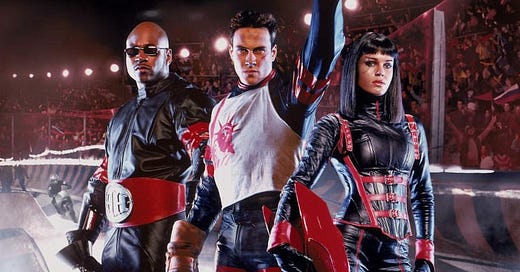In the 1980s and 1990s, film director John McTiernan was a hot commodity. In just over a decade, the Juilliard grad went on a streak that included Predator (1987), Die Hard (1988), The Hunt for Red October (1990), Die Hard with a Vengeance (1995), and The Thomas Crown Affair (1999). Despite the occasional flounder, he was a valuable asset in Hollywood.
After his remake of the Norman Jewison led The Thomas Crown Affair (1968), McTiernan started work on another remake of a Jewison picture, 1975’s Rollerball.
The original Rollerball is an underrated classic starring a top-of-his-game James Caan in one of his best performances — which definitely says something as he dominated for decades.
In the original, it is the eerily not-so-distant future (2018) and the world is no longer run by governments — it’s run by corporations. Sounds horrible, but for the average person in the film, it could be a lot worse. Unaware of the real price they are paying, they want for nothing. They have everything and enough. As long as you don’t question the Corporation and follow their orders, everything will turn out fine.
They spend their ample leisure time thrilled by the new sport of Rollerball. A gladiator-esque competition that, to put it plainly, is a mixture of hockey and roller derby. But the ball is made of steel, half the team revs around on motorbikes, and not only can you be seriously-injured, you can die. Sounds intense, but considering our real world fascination with the likes of WWE, NASCAR and the NFL, it doesn’t really seem too insane.
Jimmy Caan plays Jonathan E., team captain and veteran star of the Houston team, which is run by the Energy Corporation, (conglomerates of Transport, Food, Communication, Housing, and Luxury run the other city-states.) Houston is eyeing the Championship and it doesn’t seem like they will face too much competition on their way to the top. Jonathan is one of the game’s oldest players and a superstar amongst fans, so the Energy Corporation decides that a Championship is the perfect way to end his career. He’s told that he will be retiring — no questions asked. No reason why, no negotiating, it’s over. What will he do now? Can he fight back? How is that even possible? What is his life without the sport?
To explain what happens next would ruin the film, but needless to say, the movie will keep you enthralled by both the action scenes in the Rollerball arena and the suspense innate in an Orwellian dystopia — the uncertainty of the government or, in this case, the Corporation.
That’s the film’s real success — the social commentary and warnings presented surrounding corporate control. On top of the fact that the film poses some major questions about aging in professional sports, the power of celebrity, and our compliance with violence in both athletics and the media, the movie really shines when tackling the issues of corruption, oppression, capitalism and much more:
When are we okay with being controlled and when are we not? Why do we say “we” when referring to our favorite sports team’s win or loss? How much are we willing to sacrifice for basic necessities? What does it mean to question authority — to revolt? At what point does capitalism show its true stripes? Why are we obsessed with the lifestyles of the rich and famous? What does it mean to have privilege? What is truth and what is fiction? Who can you trust — really trust?
All of this cloaked in the guise of an action thriller — and none of this takes away from those thrilling, surprisingly violent scenes.
When it came time for the remake after another 25 years of exploring these themes through Reagan, Clintons, and Bushes, you might think the filmmakers would be weaponized with more controversy and political dissonance. They would be able to add onto the already layered portrait of our inevitable future.
Nope.
Remember, this is John McTiernan (a reminder: Predator, Die Hard). He’s not exactly one for subtly. One might expect him to cut all the sociopolitical commentary and make it a straight action film.
Well, that’s exactly what he did.
Tossing the first drafts that many believed to be superior to the original, McTiernan decided to focus on the sport itself. He fetishizes the violence, finds entertainment in the showmanship, and zeroes in on the destruction the game has on athletes’ bodies — not their minds. Norman Jewison believed the entire point of the film was to highlight the “sickness and insanity of contact sports and their allure.” McTiernan thought — it’s not exciting enough! It needs to be more like the X-Games! Ramps and obstacles galore!
Gone is the powerful illustration of consumerism trickling down from a Capitalist state. It sparks no more conversations about longevity in sports or celebrity culture. No highlights of complacency in regards to privacy invasions.
It’s all gone. It’s now an action movie. Plain and simple.
Needless to say, it’s complete garbage. It takes everything that was good about the original, that was inventive or creative or sharply analytical and ruins it. It clearly has no idea what made the original film strong or even what makes a satisfactory, comprehensible movie. It makes no sense. It’s ugly. It’s boring. It’s poorly cast, poorly written, poorly shot and directed (there’s in infamous scene entirely in night vision) and, in general, poorly constructed.
I could go on and on about how awful it is.
I’m not usually one to groan about remakes, but this one baffles me.
Luckily for my own sanity, I’m not alone. Box office receipts of $25.9 million against a budget of $70 million show that the movie bombed hard. On Rotten Tomatoes, the film has an approval rating of 3%. It was nominated for a Razzie and won three Stinkers Bad Movie Awards, including Worst Director for McTiernan, (and that’s not even the worst thing to happen to him as a result of this film. About a decade later, he served prison as a result of hiring a private investigator to illegally wiretap a producer of the film in August 2000.)
So if it’s universally panned and largely forgotten — why bring it back up?
We’re still spoon-fed remakes and rehashes constantly. Rollerball should serve as a cautionary tale for Hollywood, even two decades after its release. If it ain’t broke, don’t fix it. If it’s really good, don’t touch it. If it’s a damn masterpiece, stay far away.
On top of the calls for more originality from the studio system, it may be even more important to leave alone the films we already love. Studios don’t care about the quality of the movie, they care about money. But we vote with our wallets and have proven time and time again that we don’t like it when a remake shatters the principles and ideals of the original.
Track down the ’75 Rollerball and give it your time. It’s well worth it.







